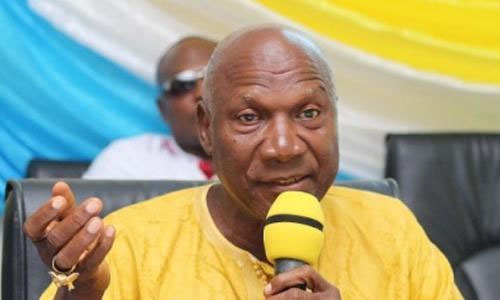Preacher people like to exploit tragedy events to anecdotally ground their preaching. Something emotionally charged like death and destruction made by one fatherland invading a motherland is perfect fodder. It’s ideal for seizing a moment to make a point for prophesy. Thus, it’s no wonder a motherland preacher person has already found a place for the global Russia over Ukraine invasion in local politics.
To me, though, the destruction of people, property, and project evidenced in video images in all forms of media about the invasion, is all about hegemony. Hegemony is the power and influence of a stronger fatherland or people over another of weaker strength.
In this motherland, sometime in the not too distant past, a coup advocate, a kingpin of ethnocentrism, who had actually attempted a coup, talked hegemony in the motherland. For all their worth, his ideas are probably still lurking in the thoughts of contemporary ethnocentrist ‘coupists.’ In written words, he made a book he called something hegemony.
From kingdom to empire to peoples and places and the current federation, Russia has always been made up of units (counties, provinces, republics, districts). Much of what is going on now with the Russia invasion of Ukraine is about that word hegemony.
In Russia’s case, the term seems to interpret as the twin terms: Russification and Russianisation. Russification is like territorial annexation, extension or expansion. Russianisation is sort of cultural assimilation, imposing Russian language, corroding another language in the process. Russification is about territorial claims while Russianisation is about language encroachment. I came across the terms in my comparative education course in my graduate education programme.
Long before the Soviet era, Russification had been practiced by resettling ethnic Russians, perhaps planting them, in non-Russian places, sort of implanting them in those spaces. It was an expansionist move in the manner Indonesia did in East Timor. Russianisation deepened Russification by imposing the Russian language on everyone within geographical areas Russia created through Russification.
Tools in Russianisation include the pedagogy of obrazovanie, using the education curriculum for inculcation of values of Russianness in the child’s total upbringing, vospitanie character formation.
Hegemony in the Russia-Ukraine relations is about the exertion of Russia power influence over Ukraine, sometimes to the extent of domination. It’s one party, the stronger, over another, the weaker. It has sometimes caused wars between nations or peoples.
Not long ago, the word ‘hegemony’ caused a major stir in the motherland. Someone of, and with, knowledge had written it in text, causing worry and fright where it could have been fear and panic had it been an act and not just in print. Even when it’s nominal and symbolic, hegemony rattles nerves because of its potential unsavoury consequences. It’s about domination and control of what one power (political nation or ethnic group) exercises over another or others.
Some will say about this beef, Dziwo fie asɛm. I concede to that. Your house is teetering at the brink of coup and you have time and effort to beef about somebody’s invasion. Well, actually, both coup and invasion have to do with some crazy dude attempting a coup like or copycatting the invader. I am trying to say it’s ɛfieasɛm too.
It’s of concern because of woyɔnkoabɔdwesɛrehye (as in the sense of hegemony and the fear for its expression based on ethnic sentiments) you fetch water. Careful, everyone, for as long as enclaves exist for hegemony advocates to exploit and also for the reason that secession and hegemony seem related in some ways. No one should forget the Gadhafi overthrow devastating raiding effects on the Sahel region.
I understand one reason for the confrontation is that the aggressor is claiming Kyiv because it is regarded as the cradle of Russian civilization; sort of Kyiv is Russia and Russia is Kyiv. The campaign, though, is looking like the aggressor never learnt Ukraine would do to defeat him what his ancestors did to defeat Napoleon.
Ours is an international community where one cannot find a single nation without a border or territorial dispute with at least one neighbor. Exploiting might is right, makes a jungle where the mightier crosses a border to seize and annex the weaker neighbour’s territory. That should be unacceptable and should be vigorously resisted.
I wish I knew the Russian and Ukrainian languages, because the two first names of the aggressor and the attacked leaders phonetically sound so close.
Invasion or coup, those who read it and think it and wish for it should take a lesson in the abhorrent pictures of fleeing people (including our own sons and daughters whose only mistake was to go seeking further education in another land). They are pictures no one wants to see. They would include ethnocentrists, who think and wish for hegemony (over lands and peoples), maybe like an obnoxious leader’s idea of hegemony.
So far, no comments, and even, maybe, commendation, not from minority spokesperson for education, for government successfully arranging Russia invasion ejected motherland medical student victims to complete their schooling in the motherland of my in-laws, Grenada. Ironically, Grenada itself was a victim of American invasion in 1983, ostensibly to save its medical students in the same institution our daughters and sons would seek sanctuary.
In 1983, my reaction to the Reagan invasion of Grenada was mixed; influenced by my aversion to coups, the American action was also to deal with coup makers, quell a coup that had been staged there.
Like hell, motherlands across the world are grappling with soaring prices of basic life necessities of food, clothing and shelter because of an invasion. Just as our coup mongers say coup, war mongers are crying third world war with the Russia Ukraine invasion. It’s world war o, the hegemony war, because both sides are recruiting the world. Anyone, anywhere on earth who believes in a side’s cause, is joining that side in the fighting. That is the world at war with itself.
By Kwasi Ansu-Kyeremeh


